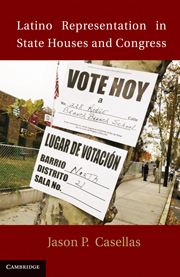Book contents
- Frontmatter
- Contents
- List of Tables
- List of Figures
- Acknowledgments
- Introduction
- 1 Latinos in Legislatures
- 2 The Effects of Population, Turnover, and Term Limits on Latino Representation
- 3 District Composition and the Election of Latino Candidates
- 4 Electing Latinos in Non-Latino Majority Districts
- 5 Voices from Within
- 6 Roll Call Voting Behavior of Latino Legislators
- 7 Conclusion
- Appendix A
- Appendix B
- Appendix C
- Appendix D
- Appendix E
- References
- Index
6 - Roll Call Voting Behavior of Latino Legislators
Published online by Cambridge University Press: 10 January 2011
- Frontmatter
- Contents
- List of Tables
- List of Figures
- Acknowledgments
- Introduction
- 1 Latinos in Legislatures
- 2 The Effects of Population, Turnover, and Term Limits on Latino Representation
- 3 District Composition and the Election of Latino Candidates
- 4 Electing Latinos in Non-Latino Majority Districts
- 5 Voices from Within
- 6 Roll Call Voting Behavior of Latino Legislators
- 7 Conclusion
- Appendix A
- Appendix B
- Appendix C
- Appendix D
- Appendix E
- References
- Index
Summary
Do Latino members of Congress and state legislators vote differently than their non-Latino counterparts? If so, what are the implications for representative democracy? Do Latino legislators vote differently across states and chambers? If so, what are some of the reasons for this? Does the percentage of Latinos and African Americans in a district make a difference in terms of how members of Congress and legislators vote? Whereas the bulk of the literature on Latino representation has examined roll call voting patterns at the national level, very little attention has been given to examining the roll call voting patterns of Latino state legislators.
This chapter examines the roll call voting behavior of Latino legislators in Colorado, New Jersey, and Texas and compares how Latinos in Congress and in their respective states vote in legislative institutions, using new data from Nolan McCarty's research on state legislative polarization as well as the McCarty, Poole, and Rosenthal NOMINATE data used in many research studies. Although not one of the seven states thoroughly discussed previously, Colorado's recent political transformations make it an exciting state to study. Through the examination of key roll call votes cast by members of Congress from districts with similar proportions of Latinos, it is possible to make some conclusions regarding substantive representation. Even though previous studies have found that the percentage of Latinos makes no difference in the roll call voting patterns of members of Congress, new evidence suggests that in some states, the Latino population is beginning to exert influence, suggesting the continued mainstreaming of Latinos in American society.
- Type
- Chapter
- Information
- Latino Representation in State Houses and Congress , pp. 125 - 137Publisher: Cambridge University PressPrint publication year: 2010



